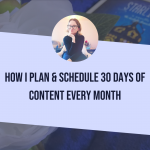Have you ever sat down to write something and found yourself entirely overwhelmed?
Maybe it was a blog post, an email, a sales page, or even a chapter of your book.
It happens to all of us, and I want you to know that there are some practical action steps you can take to navigate and ease overwhelm when it comes to writing. That’s what I’m going to be sharing with you in today’s post.
But before I walk you through four actions steps you can start taking, I want to take a moment to talk about why we actually get overwhelmed when it comes to writing.
Oftentimes, the root cause is a lack of clarity on the subject matter.
I know from all the years I’ve spent on this planet as a writing-driven individual that when I’m excited to write, nothing can stop me from doing it.
I will get up earlier to squeeze in five minutes before work, spend hours on my weekends getting words down, and sometimes write my social media posts from the toilet (TMI?)
When inspiration hits, as long as I know what I’m writing, I do exactly that. I do it in that moment, when it’s clear and compelling, and I stay attached to that high by continuing to write.
It’s when I’m unclear on my characters, or the next scene of my book, or the marketing goals of my social media posts that I get stuck. Then that leads to falling behind, which leads to feeling like I need to catch up, which is a lot of pressure… and bam, you’ve got overwhelm.
So, take a page out of my book and follow these tips which have helped me get unstuck time and time again:
1) Make use of outlines and plan ahead
If you’re a pantser you’re going to hate this tip, but I will swear by this until the day I die.
Outlining (even if it’s a very loose, bullet-point style outline) can make a world of difference when it comes to you making the most of your writing time.
I outline all my novels before I begin (see a free tutorial on how I do this here). I also outline my blogs with headings and bullet points on the points I want to discuss before I flesh out the post into an actual article. I even have an outline that I use for my copywriting work to keep me on track.
If that’s not enough for you, I also recommend keeping notes on hand for things you’re going to want to reference or use. Do your research on settings, word choices, names of foods and character descriptions ahead of time.
2) Actionable steps, not massive deadlines
This is something I teach my authorly clients over in The Authorpreneur Kingdom Membership, and it’s no surprise that the members are writing and finishing their books faster than ever before.
Every month we have a micro-goal setting process that we work through to set goals and figure out how to take action. On top of this, I encourage the members to “aim for” deadlines, rather than have them as a be-all, end-all type situation. It releases a lot of pressure around their writing projects and allows them to take it one step at a time.
I highly encourage breaking down your writing process into more manageable steps if it’s feeling too overwhelming when you first get started.
3) Self-awareness
This is probably the biggest thing you can do that will help you, and that is to be aware of why things feel overwhelming.
Your feelings are leaving clues to indicate the steps you need to take to solve the problem. For example, if you are struggling to write a new chapter because you feel unclear on your character motivations, then that’s what you need to get clearer on.
So the next questions become:
- Why aren’t I already clear on this?
- What steps can I take to become more clear?
- What level of clarity do I need to get to in order to move forward?
That’s a whole lot more useful than feeling like something is “off” and deciding to “wait for inspiration” or “put off writing” until you feel better.
4) Give yourself permission to be messy
Similar to the deadlines thing I touched on in point two, one of the biggest blocks we tend to give ourselves is putting so much pressure on our projects to be perfect, completed by a set date, and meet a particular standard.
The truth is that your first draft is always going to be messy and kind of shitty, and that’s totally okay!
The easiest way to move through the mess and polish something is to be okay with the mess, and recognize that you can always improve on it later. The one thing you can’t improve on is a blank page.
I hope you found these four tips helpful!
Like I said, these are all things that can help you come unstuck, but at the root core, if you’re unclear on your story, you’re soon going to find yourself falling back into a state of overwhelm despite these tips.
That’s where I highly recommend joining us for the Story Clarity Masterclass inside The Authorpreneur Kingdom Membership this month! Every year we do quarterly masterclasses, and this is the third class of 2021.
In this class, I’m going to be teaching you a process to help you get clear on your story idea, direction, and ways to get started writing.
Like all the previous classes, the replay will be stored in the Masterclass Vault, but attending live is the best experience because that’s how you’re going to be able to ask personalised questions to help you with your book writing.
To learn more about the membership and join (and get access to this class), click here.
You May Also Like:
Three Writing Myths That Are Just Not True
A Guide To Creating A Writing Routine
How To Stay Motivated To Write

Written by Pagan Malcolm
Pagan is a copywriter and business coach helping writers understand the business side of publishing so that they can become serious authors.
| Facebook Group | Instagram | Podcast | Website | Blog |

